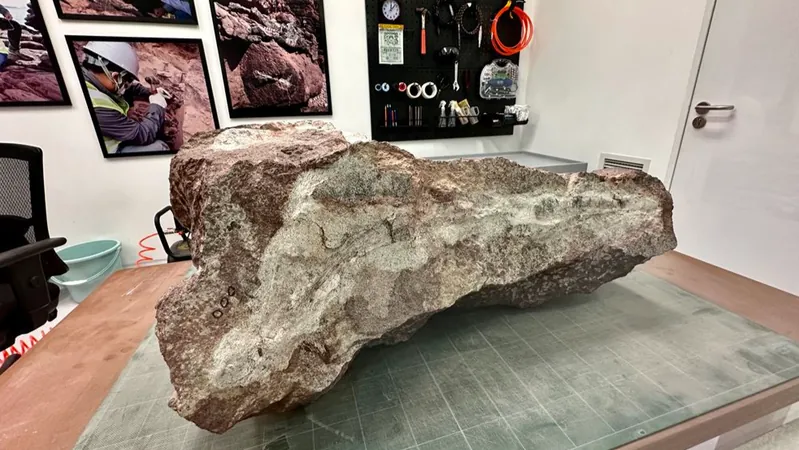
Discovering the Dinosaurs: Hong Kong's Groundbreaking Fossil Finds Spark Excitement and Interest
2024-12-31
Author: Ling
The Unveiling of Prehistoric Wonders
A landmark discovery in Hong Kong has roared to life, igniting the curiosity of both the public and the academic world. In late December, young students flocked to the Hong Kong Heritage Discovery Centre in Tsim Sha Tsui, their eyes wide with wonder as they watched scientists at work, examining stones that contained remnants of dinosaurs from the Cretaceous period dating back over 145 million years.
The excitement stemmed from the recent completion of the first-ever excavation of dinosaur fossils in Hong Kong, found on Port Island within the city's UNESCO Global Geopark. The Hong Kong government announced the discovery in October, bringing in experts from mainland China to assist in the excavation, which uncovered approximately 30 rocks embedded with ancient dinosaur remains.
Among the leading scientists were Pei Rui and Zhao Qi from the Chinese Academy of Sciences in Beijing, who shared their feelings of anticipation and disbelief as they revealed the bone structures hidden within the rocks. Zhao expressed his thrill upon confirming the existence of dinosaur fossils, stating, "When I saw the clear dinosaur features under the microscope, I immediately knew we had made a monumental discovery."
A New Era in Academic Research
Hong Kong may be known for its urban landscape of skyscrapers, but it is also home to a thriving academic community dedicated to paleontology. Michael Pittman, an assistant professor at the Chinese University of Hong Kong, stands at the forefront of this scholarly pursuit. With his team, Pittman has contributed to prestigious international publications and was instrumental in the recent findings on Port Island, which he believes will significantly elevate dinosaur research in the region.
The discovery not only adds a new location to China's dinosaur distribution map but also highlights Hong Kong's potential as an educational hub. As Pittman noted, the city possesses vast academic resources, offering students and researchers ample opportunities to engage in groundbreaking dinosaur research.
Drawing Parallels to Global Inspirations
Using Japan's Fukui City as an example, Pittman emphasized the potential commercial opportunities that could arise from these fossil discoveries. Fukui capitalized on its own paleontological findings by establishing a dinosaur-themed museum, enhancing tourism with immersive experiences and unique merchandise. Pittman suggests that Hong Kong could follow suit, potentially transforming sites like geological parks into attractions that celebrate its dinosaur legacy.
The Hidden Prehistoric Treasures of Hong Kong
The excitement surrounding the dinosaur finds is complemented by a rich history of other prehistoric discoveries in the area. Long before the current excavation, Devonian fish fossils were unearthed in Plover Cove in 1980, validating the area's geological heritage. More recently, a student in 2014 rediscovered a 147-million-year-old Jurassic fish, further highlighting Hong Kong's potential as a treasure trove of paleontological wonders.
Social media has become a platform for local fossil enthusiasts, sparking community interest and even leading to the recent discovery of a dinosaur egg fossil by a Hong Kong tourist in Guangdong. Such finds inspire a burgeoning movement to encourage education and awareness around geology and paleontology within the region.
Towards a Greener Future
Spearheading guided tours and educational programs, Erik Yip, a veteran guide at the Hong Kong Geological Park, views these discoveries as pivotal for increasing public interest in nature conservation. His goal is to foster an appreciation for the geological resources of the city, advocating for more informed protective measures among residents.
As the fascination with these ancient creatures grows, so does the responsibility for effective conservation. Yip believes the story of dinosaurs—like the blockbuster "Jurassic Park"—can captivate the public, encouraging greater engagement in scientific fields and the importance of environmental stewardship.
In conclusion, the impressive fossil finds in Hong Kong mark a new chapter in the city’s paleontological narrative, blending academic research, tourism potential, and conservation efforts into an exciting future filled with prehistoric possibilities. With various stakeholders poised to benefit, the roar of dinosaur fascination is destined to ring through Hong Kong for years to come.




 Brasil (PT)
Brasil (PT)
 Canada (EN)
Canada (EN)
 Chile (ES)
Chile (ES)
 Česko (CS)
Česko (CS)
 대한민국 (KO)
대한민국 (KO)
 España (ES)
España (ES)
 France (FR)
France (FR)
 Hong Kong (EN)
Hong Kong (EN)
 Italia (IT)
Italia (IT)
 日本 (JA)
日本 (JA)
 Magyarország (HU)
Magyarország (HU)
 Norge (NO)
Norge (NO)
 Polska (PL)
Polska (PL)
 Schweiz (DE)
Schweiz (DE)
 Singapore (EN)
Singapore (EN)
 Sverige (SV)
Sverige (SV)
 Suomi (FI)
Suomi (FI)
 Türkiye (TR)
Türkiye (TR)
 الإمارات العربية المتحدة (AR)
الإمارات العربية المتحدة (AR)